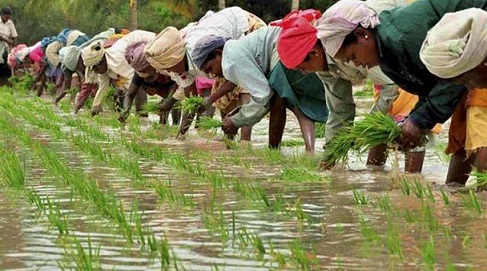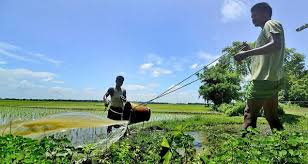Farmers in India have taken intelligent decisions by shifting of sowing pattern frequently suiting to the climatic condition and requirement of the nation. But, farmers’ such decision depends heavily in rainfalls during the kharif sowing season and cold waves in the winter season. Intensity of these two natural occurrences determines sowing and availability of agriculture crops in India.
 But, famers want sustainable crop pattern for their own future planning. Long time continuation of one crop by a group or a region specific famers help them do proper planning of sowing, plant care, harvesting and selling of their agri output.
But, famers want sustainable crop pattern for their own future planning. Long time continuation of one crop by a group or a region specific famers help them do proper planning of sowing, plant care, harvesting and selling of their agri output.
According to research done by The International Assessment of Agricultural Science and Technology for Development [IAASTD], an initiative of the United Nations and World Bank, if a solutionis to be found for the current crisis in the agriculture sector, the way forward is to encourage small-scale farmlands and sustainable agricultural methods. Even in India, agriculturists like Subhash Palekar have demonstrated that natural and traditional farming methods can help crops flourish.
“Sustainable agriculture help farmers plan their crop pattern, sowing of seed, irrigation and moisture related decisions, harvesting and selling their produce. Better planning would help achieve better domestic realisation and export growth to fetch higher prices. Today, farmers plan their seed sowing depending upon the market condition of the respective output two years ago. A sustainable agriculture would help them plan entire agricultural needs including science and technology well in advance to achieve higher output and double their income as the Prime Minister Narendra Modi envisages to achieve by 2022,” said S Ganesan, Vice President, UPL Ltd.
Sustainable agriculture requires eco-friendly agricultural practices to be used. Special attention to conservation of the environment as well as to crop yield is crucial; hence the use of mechanization, fertilizers, pesticides, etc. had to be controlled.
Experts also said that sustainable agriculture would also help reduce farmers’ suicide automatically with improvement in their loan repayment capacity.
Some of the sustainable agricultural practices are
- Conservation of local land crop varieties over hybrid high yielding varieties.‘ Desi’ (local) variants not only maintain crop diversity but also have useful genetic traits like resistance to disease, pest and droughts as well as nutritive value specific to the area which can benefit future crop improvement programs.
- Conservation of water and watershed management. Not all regions get sufficient rainfall for growing crops. Hence rainfall and irrigation management techniques like water harvesting and evapotranspiration are implemented. These help reduce water logging and salinity. Water-shedding helps optimize usage of land, water and crops.
- Adopting tillage conservation methods that involve disturbing the top soil level to the bare minimum and leaving crop residues in the soil. This helps maintain the biological activity, organic and nutrient matter of the soil.
- Use of natural compost, manure and animal waste, which can revive the fertility and nutrient value of the soil, as well as protect the useful flora and fauna in the soil.
- Weed and Pest management is another important sustainable measure. Weeds help control crop diseases and pests, conservation of soil and moisture, and nutrient cycling. Hence in sustainable agriculture, weeds are tolerated and encouraged up to a certain extent.
- Another important step introduced is the age-old practice of crop diversification. Crop rotation, mixed cropping and intensive cropping are some of the methods implemented to enhance yield but also reduce the soil erosion.
Some of the public and private sector fertilizer companies are actively promoting sustainable agriculture with biological supplements to ameliorate the damage caused by chemical fertlizers. These companies are now advocating biofertilizers in addition to chemical fertilizers for soil health.
A few Indian seed companies have also started focusing on development of “sustainable agriculture” with an aim to realize long term benefits. Some of the Indian companies like Nuziveedu Seeds Limited have initiated in-house trials using natural materials and methods of zero-budget farming. The company is also working on development of different formulations of biologicaland bio-inoculants for their seeds with Nitrogen fixing and Phosphate solubilisation bacteria. Other seed companies are also actively working on developing specific biological coatings on their seeds to protect and enhance crop productivity.
In addition to the obvious benefits of improved productivity, sustainable agriculture will also hugely improve the lives of the farmers and traditional communities, for whom farming is their sole livelihood. In the current scenario where the farming community is facing great upheaval, the need of the hour is to embrace agricultural sustainability. To provide a brighter future to those who feed the nation!



